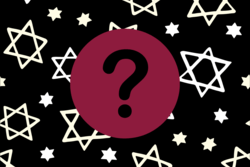Fighting Contemporary Antisemitism: From High School Textbooks to the Halls of the Capitol
I didn’t think it was that bad. Antisemitism, that is. Growing up, antisemitism was something I was warned and taught about (“this is what happened to your people''), but it felt long ago and far away. Of course, I read plenty of books about the Holocaust at my Jewish elementary school. I played games with friends where we fled from imaginary Nazis. We packed our bags with our most prized possessions in an imitation of characters in the books we were reading. But none of that could touch me, I believed, a young girl growing up in the United States surrounded by a strong and ever-present Jewish community.
Looking back, I realize how privileged I was to have grown up in the environment that I did as the child that I was: to have access to a Jewish day school, sleepaway camp, and synagogues of all different denominations, and to be welcomed in each of these spaces because I look how Ashkenazi American Jewish spaces expect me to look.
As I grew up and learned more about the world and politics, I discovered the threat of right-wing antisemitism: A white man with ominous tattoos and a backpack appeared at synagogue services (despite extensive security); people protested outside the house of the Ohio Health Director, carrying signs blaming Jews for the pandemic in my own neighborhood. These events scared me, but I consoled myself that these people were on the fringe of society; no reasonable person believed these things.
Only this past school year did I begin to realize how deeply-rooted antisemitism is—in all parts of society. Online learning during COVID sucked, but I was excited for my AP Government class at my non-Jewish high school. On the first day, we were assigned a reading in the textbook. I didn’t get far; on page fourteen, there was a picture of Sheldon and Miriam Adelson, the pair of whom were meant to exemplify elitism in government. Apparently, the only textbook example of elitism was a Jewish couple who mainly donated to Israel-related causes. Regardless of my own opinions of the Adelsons, I recognized the dog whistle of “Jews as wealthy government-controlling elites” from reading about far-right antisemitic conspiracy theories; I was shocked to see it repeated in a widely-used textbook. My education was seemingly perpetuating antisemitic tropes, and I wouldn’t have even noticed them if I hadn’t learned about antisemitism by my own initiative.
Since discovering subtle antisemitism in my AP Government textbook, I haven’t read any of the assigned pages. But I have read more about antisemitism and how it functions. I’ve learned that antisemitism is older than Christianity, but many modern antisemitic tropes originated in the Church. I’ve learned that it often functions cyclically, with periods of apparent Jewish prosperity followed by periods of extreme violence and/or expulsion. I’ve learned how antisemitism, alongside anti-Black racism, is one of two core tenets of White Supremacy. I learned that it predates and supersedes left-right politics and that, due to its antiquity and flexibility, everyone has antisemitic biases simply from existing in our society.
The reaction in my social media feeds to the white supremacist groups storming the Capitol confirmed my newfound realization about ingrained antisemitism. There were Nazis wearing shirts with slogans like “Camp Auschwitz Staff” hanging Nazi flags next to their Confederate flags in the Capitol building. Yet only one non-Jewish white friend on social media mentioned the antisemitic motives many of the terrorists proclaimed. This silence scared me more than the far-right conspiracy theorists themselves. As I scrolled through Instagram, I wondered just how blatant antisemitism would have to be for non-Jews to recognize it.
Maybe I shouldn’t expect better from society. Even my Jewish education and community failed to prepare me for these realities. My community taught me about the Holocaust, but sheltered me by not teaching me about modern antisemitism or even its history. If antisemitism education is this inadequate within the Jewish community, what can we expect outside the community?
We have a multi-part dilemma: Antisemitism is so ingrained that receiving an education in the US means internalizing antisemitic tropes, which dissuades people from recognizing blatant (much less subtle) antisemitism, and existing education surrounding Jews and antisemitism focuses on the Holocaust, ignoring the larger societal beliefs behind it.
What can be done? A good place to start is making sure that school textbooks aren’t casually perpetuating hate, not only regarding Judaism and Jewish representations, but other clear examples like dehumanizing and incomplete lessons about slavery and depictions of the Middle East and Africa as barbaric and uncivilized.
Next, we need to call blatant (and subtle) antisemitism what it is. All too often, the media ignores antisemitism while each political side twists it to attack the other, thereby “acquitting” themselves of their own antisemitism. Just as frustratingly, anti-racist non-Jewish white allies often don’t understand how antisemitism plays into white supremacy, and don’t call it out (or worse, perpetuate antisemitism themselves). When activists don’t combat antisemitism alongside racism and other forms of hate, they aren’t effectively combating white supremacy because antisemitism works as its justification. For the sake of success in anti-racist organizing, we need to understand the history of antisemitism in relationship with white supremacy and fight its modern-day manifestations.
Lastly, education about the Jewish people, the Holocaust, and antisemitism today is inadequate, even at Jewish schools. During my Jewish education, we learned about the horrors of the Holocaust, but were given only vague reasons as to why the Nazis targeted Jews. This instilled in us a fear of Nazis, but not much practical knowledge that could be used to confront modern antisemitism. We were given “Never Again” as a hazy slogan. My secular Holocaust education was even weaker; it consisted of a footnote for World War II, or one sentence in the larger story about America "saving the day." The remedy is clear: lessons on the Holocaust need to be taught with a focus on antisemitism (and America’s own antisemitism needs to be addressed) to make “Never Again” a reality.
There’s been a more widespread cultural awakening about the tarnished foundations of our society during the pandemic. More and more people recognize how deep-seated racism, homophobia, misogyny, Islamophobia, ableism, and xenophobia truly are in America. So much of the way we understand and interact with others in society needs to be reevaluated. Similarly, the way we teach and fight antisemitism must be changed. Only with organized strategies can the public even begin to understand antisemitism and join in the fight against it.
This piece was written as part of JWA’s Rising Voices Fellowship.







Don't forget the Squad.
I am a Holocaust survivor. Recently, I was asked to be on a panel discussing anti-Semitism by PBS station WEDU in Sarasota, where I live. This article will be helpful in my doing so.
Anti-Semitism is as strong or stronger among the "progressives." It is even more insidious as they often are hidden. We must fight anti-Semitism in all it forms. Time to get past white supremacy and call out all racism.